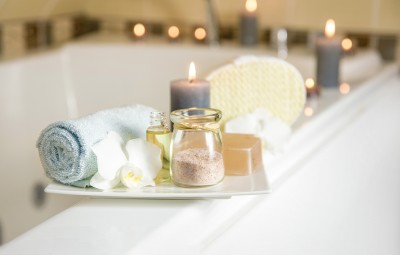We all know the world of difference a night of quality sleep can make. A sleep deprived mind and body impacts everything from our work performance to our personal relationships. It can rob us from the sparkle in our eye and the pep in our step.
Since as far as we date back, humankind fell asleep with the stars and has woken up with the morning sun.
The setting sun cued us that it was time to simmer down, rub our bellies and relax after a busy day fighting sabre tooth tigers. Often, we’d fall asleep beside a fire and its glowing garnet red embers would be the vision our psyche would drift off to before doing it all over again. This is why the fireplace or "hearth" is the hottest destination usually in any home that has one, or why we gather round fires outdoors with our contemporary "tribe". This ancient ritual has wired us to do so.
In one way or another, we operate on a 24 hour cycle every day of our lives that has been embedded into us, and ultimately it is the sun we are entrained to. All living things are. Plants and animals included (some may argue this). This approximately 24 hour clock we are referring to is called the Circadian Rhythm from the Latin “Circa Diem”, meaning “About a day”. (A fairly recent scientific discovery).
Our body’s biology is synchronized to this clock that tells us when to wake up and go to sleep. In fact every cell has its own clock but the master clock for your sleep/ wake cycle resides in our brain and is called the “suprachiasmatic nuclei”. The SCN is located in the hypothalamus gland which is responsible for releasing hormones and regulating body temperature. Consider it the conductor of your body’s orchestra.
Without getting too scientific, light absorbed through the eye is the key stimulus that sends signals to this mechanism in your brain, which in turn triggers the symphony of biological processes such as hormone release, body temperature and when to wake up and fall asleep. Simply put, light inhibits the production of melatonin, which is the key ingredient in getting restorative shuteye.
Fast forward to the current blip we are in during the Holocene era, 2020. Flying cars aren’t the norm yet, but it’s safe to say we are catching up to a science fiction movie with digital screens blanketing us steadily throughout the day, AI etc. The point being, we are awake long past our bed times (you are exempt if it’s because you are reading romantic poetry to your beloved or dancing the tango in Argentina especially). Sadly, because our modern society spends more than 90% of time indoors bathing in the light of computer screens and other sources of electric light, this has created havoc on our health. We have only begun to understand the role of light and its impact on human health quite recently.
Building architecture and its use of sunlight to illuminate spaces changed dramatically in the early 1900’s when electric light was introduced to the mainstream, resulting in many of the sun deprived floorplans most of the depleted workforce is so familiar with. The sunlit offices on the perimeter traditionally being reserved for upper management and executives. Architects, engineers and the community at large are tirelessly reshaping this experience which is a wonderful evolution in design.
Back to light, there is both a visible and invisible spectrum. Let’s focus on “blue” light spectrum of concern specifically. Blue light from natural sources such as the sun, which is part of a visible light spectrum, is exactly what we need to kick start our day and keep us alert through the afternoon. The problem often is that we get bombarded with too much light at night and not enough during the day. And if we do get an adequate supply, the quality and source of light can be a factor. Think FM radio vs Hi-fidelity sound, which applies to lighting as well.
The lighting from fluorescent T12s still installed in so many office buildings for example, have been associated with many health concerns. For instance the “flicker” from fluorescents lamps can trigger anything from a headache to seizures and are considered a hazardous waste material.
Those most prone to circadian related issues tend to be shift workers, travellers changing time zones and teenagers during puberty. Teenagers, in their defense, really should be able to sleep in, as puberty and hormones cause their clock to shift by a couple hours and make them groggy and in a cranky mood.
Luckily the concept of “wellness” for humans is finally being recognized and making its way into the code and policy books. The advancements in science such as “tuneable” lighting which can be programmed to simulate a 24 hr day cycle being one of the technologies being made available, improvements are being made.
In conclusion, in times like these of heightened stress and uncertainty, a good sleep is crucial more than ever.
One of our specialties is our curated relaxing music and sleep music channels such as Deeper Sleeper, that can help lull you to sleep and oil up those jammed clock gears.
A couple of easy fixes to course correct your confused body clock for a better rest are:
- Eliminate screen exposure at least 1 hour before bed.
- Use blue light reduction/elimination features such as https://justgetflux.com/ or the “Night Shift” setting on your Apple products, “Blue Light Filter” on Androids.
May you sleep tight and wake up feeling bright.
Love, Calm Radio
~
Listen to relaxing sleep music and 1000+ channels of relaxing music, calming meditation music, classical music on the Calm Radio app for all mobile platforms. Read about the importance of rest and listen to beautiful Christian music here.




